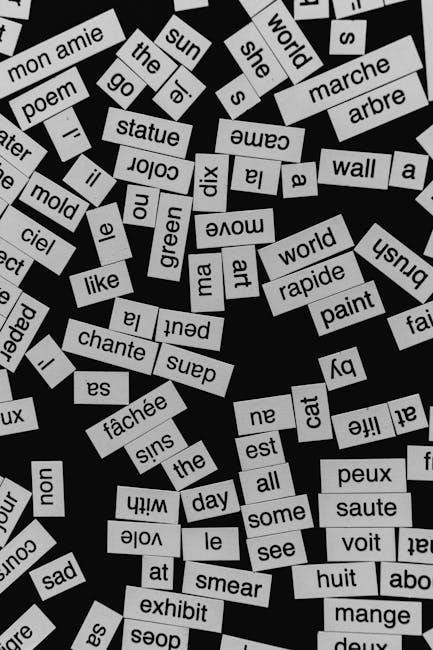“Invictus” is a powerful poem by William Ernest Henley‚ celebrating resilience and the unbreakable human spirit. Its profound themes and vivid imagery resonate universally‚ making it a timeless classic.

Overview of the Poem’s Significance
“Invictus” holds profound significance as a motivational piece‚ embodying resilience and courage. Its universal themes of overcoming adversity resonate across cultures and generations‚ making it a celebrated anthem for personal strength. The poem’s brevity and directness amplify its impact‚ allowing readers to connect deeply with its message of defiance and hope. Widely shared and referenced‚ “Invictus” has become a cultural symbol of perseverance‚ inspiring individuals in various contexts‚ from sports to personal struggles. Its timeless appeal lies in its ability to empower and uplift‚ solidifying its place as a cherished literary work.
Historical Context and Background
“Invictus” was written in 1875 by William Ernest Henley‚ a British poet‚ during a tumultuous period in his life. Henley composed the poem while recovering from a leg amputation due to tuberculosis‚ a disease that plagued him for years. The poem reflects his personal struggle and defiance in the face of adversity. Its creation coincided with the late 19th century’s societal challenges‚ making it a powerful anthem for resilience during a time of widespread hardship. The poem’s themes resonated deeply‚ becoming a symbol of courage and determination for people facing adversity. Its historical roots are intertwined with personal and societal struggles‚ cementing its enduring relevance.

The Author: William Ernest Henley
William Ernest Henley was a British poet‚ editor‚ and critic‚ best known for his iconic poem “Invictus.” Born in 1849 and passing in 1903‚ he was a key figure in Victorian literature‚ championing resilience and strength through his work. His writings often reflected his personal struggles and philosophical outlook‚ inspiring countless readers. Henley’s legacy endures as a celebrated poet and a promoter of emerging literary talent during his time.
Biography and Literary Contributions
William Ernest Henley was a British poet‚ editor‚ and critic‚ born in 1849 in Gloucester‚ England. He developed a passion for poetry early in life‚ despite struggling with tuberculosis‚ which led to the amputation of his leg. Henley’s literary career flourished as he became a prominent editor of magazines like the London Magazine and New Review. His poetry‚ including “Invictus‚” is celebrated for its themes of resilience and defiance. Henley also wrote essays and plays‚ leaving a lasting impact on Victorian literature. His support for emerging writers further cemented his legacy as a influential literary figure of his time.
Personal Struggles and Their Influence on “Invictus”
William Ernest Henley underwent immense personal trials‚ including a battle with tuberculosis that led to the amputation of his leg. During his hospitalization‚ he penned “Invictus‚” a poem reflecting his resilience. The poem’s themes of defiance and hope were deeply influenced by his health struggles. Henley’s experiences with pain and adversity shaped his writing‚ infusing it with raw emotion and strength. His journey through hardship not only inspired “Invictus” but also resonated with readers facing their own challenges‚ making the poem a universal anthem of perseverance.

Themes and Messages in “Invictus”
“Invictus” explores resilience‚ hope‚ and the indomitable human spirit‚ emphasizing courage in the face of adversity. Its themes inspire strength and self-determination‚ transcending personal struggles universally.
Resilience and Defiance in the Face of Adversity
“Invictus” embodies resilience and defiance‚ capturing the speaker’s unwavering spirit despite severe adversity. Henley’s vivid imagery and powerful language convey the triumph of the human will over suffering. The poem’s central theme of perseverance in the face of overwhelming odds resonates deeply with readers‚ inspiring strength and hope. Through its unyielding tone‚ “Invictus” becomes a rallying cry for those facing personal struggles‚ emphasizing the power of inner fortitude and the unbreakable spirit. This theme is central to the poem’s enduring appeal and universal relevance.

The Power of the Human Spirit
“Invictus” is a poignant celebration of the human spirit’s indomitable power. Through vivid imagery and bold symbolism‚ the poem conveys the idea that the soul remains unbroken even in the face of extreme suffering. The speaker’s defiance and gratitude for an “unconquerable soul” underscore the triumph of inner strength over external hardships. This theme of self-determination and hope resonates deeply‚ making the poem a beacon of inspiration for anyone facing adversity. Its timeless message reaffirms the human capacity to endure and rise above challenges‚ embodying the essence of resilience and unwavering courage.

Poetic Structure and Literary Devices
“Invictus” features a robust structure with a consistent rhyme scheme and meter‚ enhancing its rhythmic appeal. Rich imagery and symbolism amplify its emotional depth‚ creating a lasting impact.
Rhyme Scheme and Meter
“Invictus” follows a consistent rhyme scheme of ABAB‚ with each stanza containing four lines. The meter is predominantly tetrameter‚ creating a rhythmic and powerful flow. This structure adds to the poem’s musicality‚ making it memorable and impactful. The rhyme scheme enhances the emotional intensity‚ while the meter underscores the speaker’s determination and resilience. Henley’s use of a regular meter and rhyme emphasizes the poem’s themes of control and triumph over adversity‚ making it both aesthetically pleasing and thematically cohesive.
Imagery and Symbolism
“Invictus” employs vivid imagery to illustrate the speaker’s journey through suffering and triumph. The “night that covers me‚ black as the pit from pole to pole” symbolizes overwhelming adversity. The “bloody head” represents physical and emotional pain‚ while the “unconquerable soul” embodies resilience. The poem’s imagery evokes a sense of darkness and struggle‚ contrasted with the light of inner strength. These symbols reinforce the theme of defiance‚ creating a powerful visual narrative that underscores the indomitable human spirit. The imagery and symbolism are central to the poem’s emotional and motivational impact.

Impact and Legacy of “Invictus”
“Invictus” has inspired countless individuals worldwide with its message of resilience. Its popularity endures‚ featured in popular culture and widely shared in PDF formats for easy access.
Popular Culture References
“Invictus” has become a cultural icon‚ frequently referenced in films‚ sports‚ and motivational contexts. Its famous lines‚ such as “I am the master of my fate‚” resonate deeply. Nelson Mandela often recited the poem‚ symbolizing his own resilience. In sports‚ teams and athletes have used it to inspire determination. The poem also appears in movies and music‚ further cementing its legacy. Its themes of courage and defiance continue to captivate audiences‚ making it a timeless source of motivation across various platforms and industries. Its influence extends beyond literature‚ embedding itself in global culture.
Modern Relevance and Interpretations
“Invictus” remains a potent symbol of resilience in modern times. Its themes of hope and defiance continue to inspire individuals facing personal struggles or societal challenges. The poem’s message transcends its historical context‚ offering solace and strength to those dealing with mental health issues‚ personal losses‚ or systemic inequalities. Contemporary readers interpret it as a call to self-empowerment‚ emphasizing the importance of inner strength. The poem’s versatility allows it to resonate with diverse audiences‚ making it a timeless source of motivation in today’s fast-paced and increasingly complex world. Its relevance endures‚ proving poetry’s enduring impact on human experience.

Accessing “Invictus” in PDF Format
“Invictus” in PDF format is widely available through educational institutions‚ libraries‚ and online platforms. Search for reliable sources using keywords like “Invictus poem PDF” to find free‚ legal downloads.
Where to Find Reliable PDF Sources
Reliable PDF versions of “Invictus” can be found through academic databases‚ libraries‚ and reputable online platforms. Start by searching educational institutions or public libraries‚ as they often provide free access to literary works. Use specific keywords like “Invictus poem PDF” or “William Ernest Henley PDF” for accurate results. Ensure the source is trustworthy by verifying the publisher or institution. Avoid unofficial websites to maintain quality and legality. Many universities and online archives offer downloadable versions for educational purposes. Additionally‚ platforms like OpenStax or JSTOR may host the poem. Always check for copyright compliance before downloading.

Guidelines for Downloading and Sharing
When downloading “Invictus” in PDF format‚ ensure the source is legal and respects copyright laws. Use the document for personal or educational purposes only. Sharing should be limited to non-commercial use and must credit the original author or publisher. Avoid distributing the PDF without proper permissions; Always verify the source’s legitimacy to prevent downloading unauthorized or altered versions. If sharing‚ provide a link to the original source rather than the file itself. Respect intellectual property rights and support creators by purchasing or accessing the work through official channels when required.




Leave a Reply
You must be logged in to post a comment.